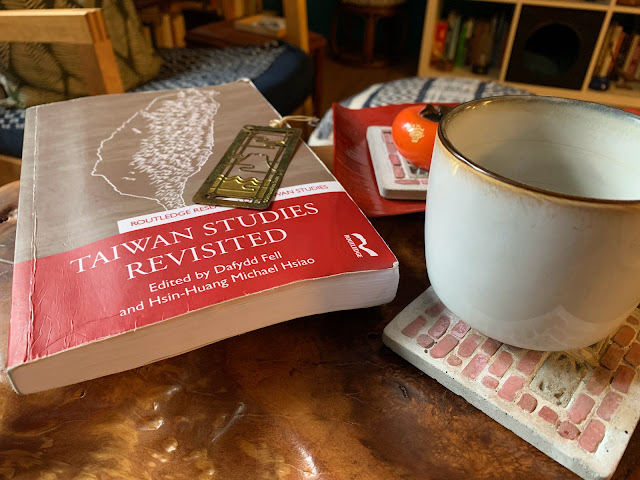Content note: this book is about sexual assault and domestic violence. I don't know what else to say. Don't read this book (or this post) if you aren't in a place where you can engage with such topics.
* * *
Years ago in a used bookstore in downtown Singapore, I came across a lonely copy of The Butcher's Wife, by Li Ang.
Li cemented herself as one of my favorite Taiwanese authors with The Lost Garden, only recently available in English translation despite not being a new novel. The Butcher's Wife, however, is probably her most famous work. You're unlikely to find the translated edition in a library or bookshop, but Amazon seems to offer it.
To be honest, it's barely a novel. I'd call it a novella. A very long short story. It's straightforward, and brutal.
The brevity of the story renders it highly engaging. Longer works of Taiwanese fiction tend toward narrative structures that can be a little hard to follow. Stories branch out or coil around in a spiral, glancing at the main plot -- perhaps sideswiping it now and again -- until zeroing in at the last moment. (The Lost Garden certainly did this). The Butcher's Wife, in contrast, opens with an arresting scene. I mean that literally: Lin Shi spies her mother having sex with (or rather, being haved sex with) a soldier, whom we later learn has promised the malnourished woman two rice balls in exchange.
It's not consensual, as even "willing" sex work in desperate circumstances -- when you wouldn't have agreed if you didn't need the money, food or housing -- generally isn't. But, according to the family members who hog-tie her to a pillar in the ancestral hall, that's not good enough: she didn't put up a fight, her dress was still intact and freshly pressed, so the act of a hungry woman is considered adultery, not desperation.
This sets the story in motion, leading Lin Shi herself to be banished from her family and married off to a pig butcher.
It's also the first time the story shows us that the status of women in Taiwanese society, or any patriarchal society (which is to say, just about all of them), isn't due to some sort of natural difference between the sexes or any notion of fairness. It's a horrific triad of economics, violent misogyny, and silence.
Later on, Lin Shi herself remarks that she is not entirely unhappy married to "Pig Butcher Chen". She has food and shelter, which isn't exactly nothing in 1950s rural Taiwan, for a woman with a so-called questionable past. Chen Jiangshui, the butcher, spends his mornings slaughtering pigs, comes home and rapes Lin Shi almost daily, and then gambles and drinks for the rest of the day. Lin Shi almost begins to endure it, thinking her life isn't terrible.
In short, she's starting to come around to the idea that men are terrible, but it's possible to grit your teeth through their abuse if the rest of your life is going well enough.
But then we learn that Chen specifically enjoys the screaming of a trapped woman. Before marriage, he paid prostitutes generously to scream like a stuck pig; it's implied that he enjoys butchery for the same reason. His butcher's knife is implicitly compared to his penis, and the squeals of pigs trapped in the "V-shaped" butcher's table (hm) contrasted with the screams of his abused wife.
This could be read narrowly as the story of one sadistic man who gets off on violence. But Lin Shi was put in this position because all of society seems to enjoy watching women suffer. If they didn't, why would they have created abusive structures like the ones Lin Shi and her mother are both forced to endure?
You'd think my least favorite character in The Butcher's Wife would be Chen, but it's actually elderly neighbor Auntie Ah-wang. She's the elderly archetype of every gossipy bint I've ever known or read about, and I've known a few real-life versions of her. She's endured violence at the hands of patriarchy as well; her feet had at one point been bound, which has disabled her for life. However, they were unbound early (we aren't told why, but my educated guess is that the family couldn't afford to keep her sedentary at home; perhaps they needed her to work). She gets into an argument with her daughter-in-law, who attempts to stand up to her. Through drastic means, she wins.
Auntie Ah-wang hides behind a nearby wall listening to Chen rape and abuse Lin Shi. She knows it is rape, because at first she offers the young bride a soothing ointment. Later, she tells all the women of the village that Lin's cries are of sexual ecstasy and that the girl is a slut just like her mother. }
This is where society is complicit in Chen's treatment of Lin: he wouldn't be able to treat her as he does if her neighbors objected. Not only do they condone his behavior, but praise him -- and his upholding of patriarchal structures, which include some respect for much older women -- while victim-blaming Lin Shi. Even in attempting to create some small measure of economic freedom when her husband stops bringing her food, she's mocked by other women and further abused by him.
It's not just men. It's certainly not just a few violent men. It's all of society, women included, and the economic structures that uphold patriarchy. Which, to be clear, are just about all economic structures. (Yes, even communism. Sorry tankies.)
This sets the characters on a path to annihilation. The Butcher's Wife was written in the 1980s so it's hardly a spoiler, but I won't divulge the ending here in case you're unaware.
The Butcher's Wife was difficult and disturbing to read. The characters reminded me so much of patriarchal violence I've seen and heard about in real life, from shades of Auntie Ah-wang in the pink-vested women who would hand out anti-gay literature during the referendum to the stories of domestic abuse and societal complicity that I heard about living in China. One woman I know married the only make foreigner in town, even though he too was pretty awful, because the entire town blamed her for divorcing her husband. "A man never beats a good wife, so she must have done something to deserve it," they apparently said.
I am sadly reminded of a friend who took her life. Her boyfriend was not abusive, but her father kicked her out of the family, her mental health problems prevented her from holding down a job, her former boss was petty and vindictive, suing her for something I am quite certain he knew she never did, and she didn't receive nearly enough social support. Her friends tried to help, but ultimately we failed. I'll never fully forgive myself for this, and I'll always struggle more than I otherwise would to read stories like this of society failing women. I suspect most women have experienced a trauma that affects them in some way, as well.
Lin Shi doesn't even get that much acknowledgement. She takes her fate into her own hands, and for it, she is condemned by the village for being the only one at fault. Leading the pack, of course, is Auntie Ah-Wang.
I have one final observation to make. It's a fairly obvious one. Sometimes I come across foreigners in Taiwan who think this is a gentle society of school-obsessed nerds who, I dunno, study engineering and drink tea in fine porcelain cups and never do crime. This is simply not true. Taiwan has higher domestic violence statistics than you might think, though they are lower than in Australia, which has a comparable population. Cases have been rising, not falling. Spousal abuse was only outlawed in 1998 (!), meaning it was still legal when The Butcher's Wife was written. Marital rape was outlawed at roughly the same time. There was no law against stalking until 2021, which is terrifying.
When I first moved here I felt like Taiwan was a crime-free society! Of course this is ridiculous, but just the ability to safely walk around alone at all hours of the night was astounding to me. I've been sexually harassed and assaulted in India, nearly mugged twice in Washington DC, followed and catcalled in countless other cities.
But no, patriarchy is everywhere. Even seemingly 'safe' Taiwan. The Butcher's Wife may have been written in the 1980s, about what I presume was the 1950s (given the presence of the soldier in the beginning of the story). But it tells a tale as old as time: it's not just men who are beasts. It's all of us.







